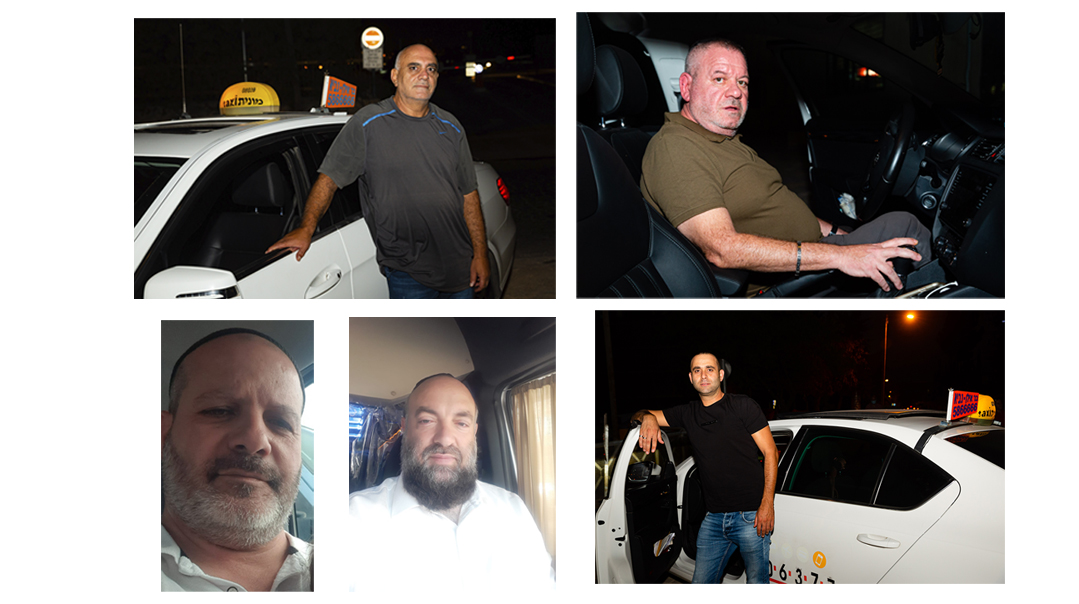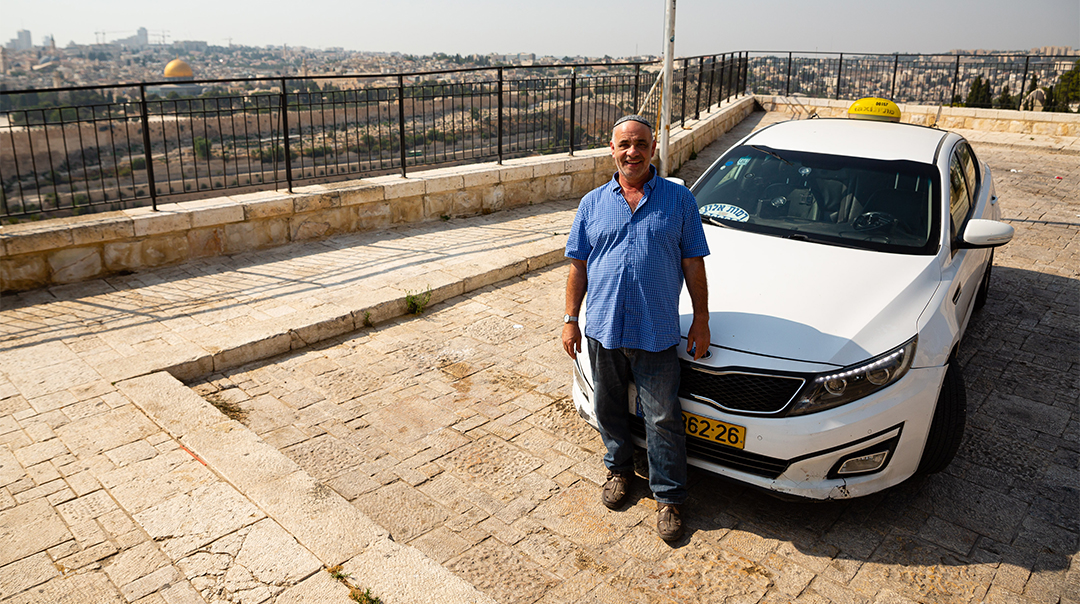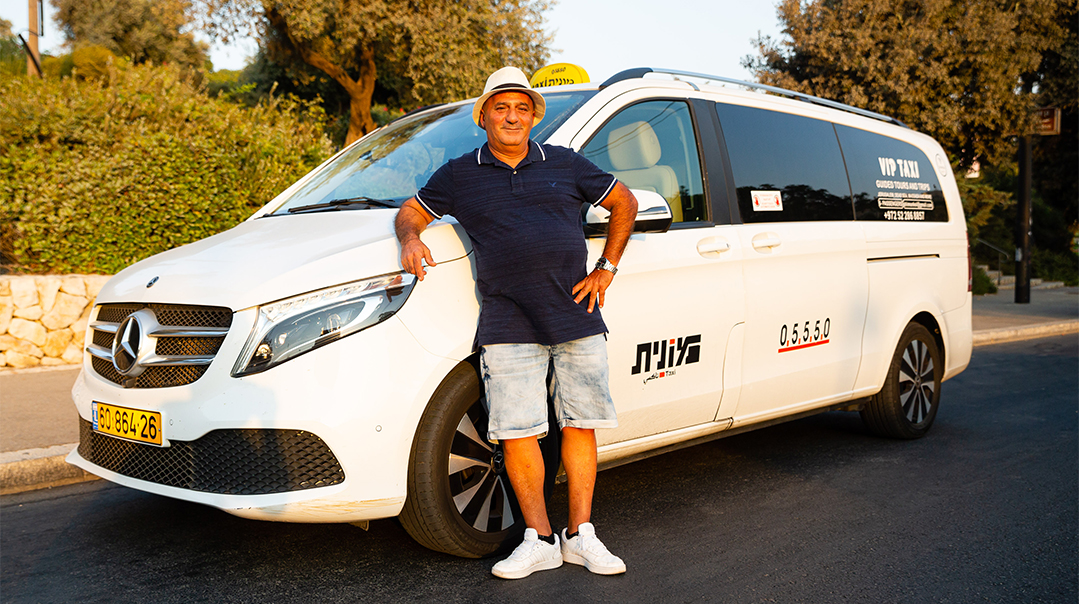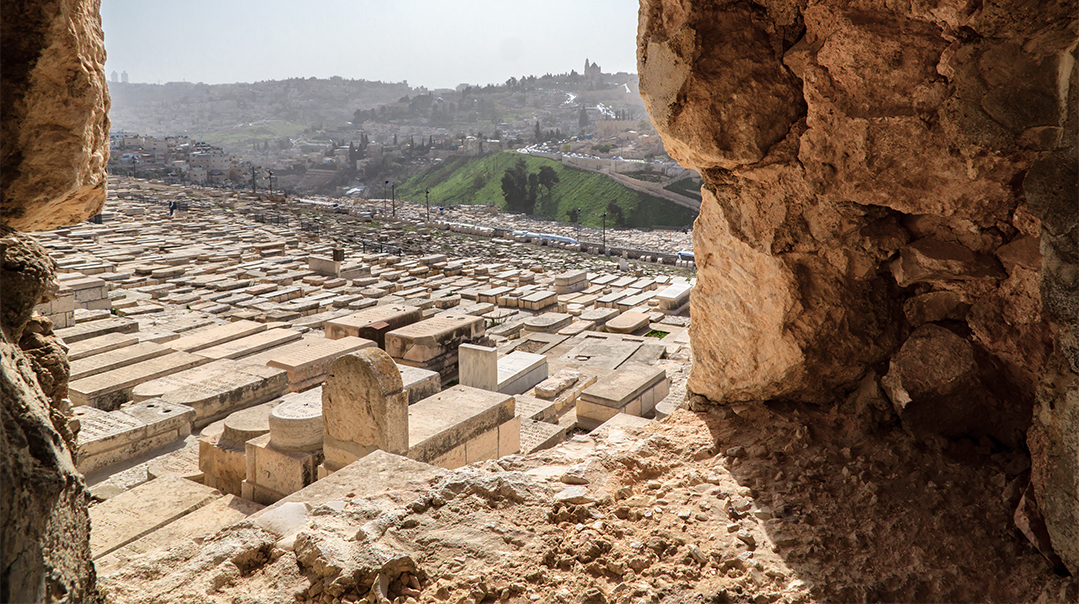Taxi Tales

When we Anglos think of the Holy City, we envision these drivers as part of the character, the spirit, the fabric of the place
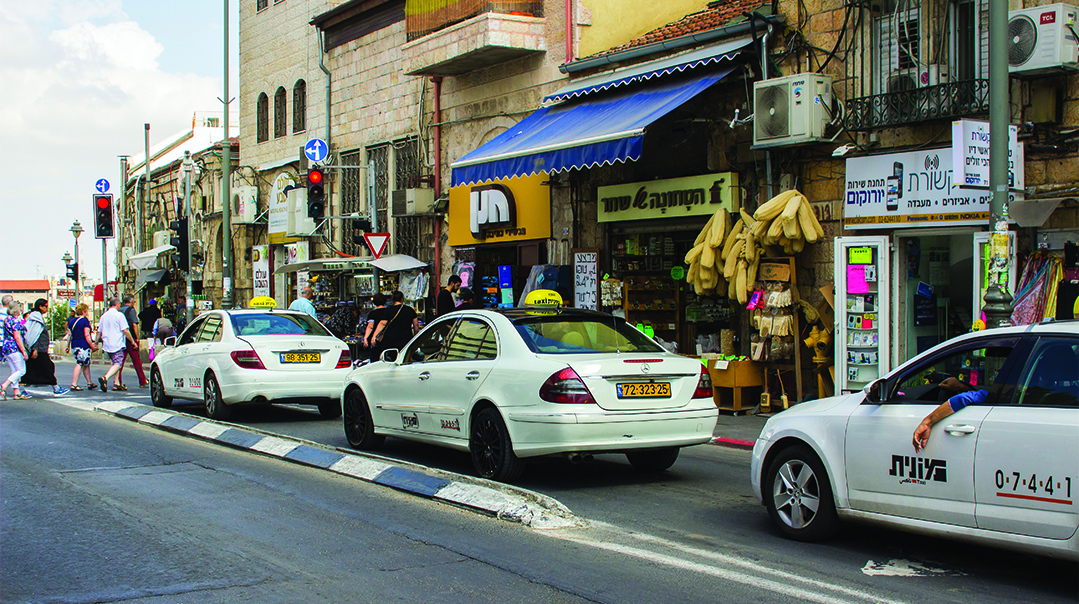
A Taxi Tale from Avraham Shusteris...
I
was traveling from Beit Shemesh to Gedera to visit my grandmother at the geriatric rehabilitation hospital. My driver was young and energetic, a secular twenty-something named Hagay. He was beaming when he picked me up. He had just brought his brand-new taxi – his baby – back from the carwash.
“What do you think about this?” he asked me. “A dream, no?”
To us spoiled Americans, it was a regular taxi, but to him it was his pride and joy.
“Most people hate their jobs, but I love mine,” he continued. “There’s nothing like driving through Eretz Yisrael, feeling the wind blow against your arm and watching the beauty of the land surrounding you.”
On the way back from the hospital, I asked Hagay if he had ever heard of the Kever of Dan ben Yaakov, as I was told it was somewhere near Beit Shemesh. He nodded and said that he had been there before. Twenty minutes later, Hagay stopped the car—he had brought me to the kever. He took a kippah out of his pocket and passed me a Tehillim from his glove compartment. We stayed at the kever for about 15 minutes, during which at least six or seven people stopped to schmooze with Hagay – he was obviously a regular.
And no, he didn’t charge me for the detour.
Avraham Shusteris is an accountant in Ramat Beit Shemesh. He made aliyah from Monsey with his family in 2018.
A Taxi Tale from Boaz Bachrach...
I’d never skipped night seder before, so I was hesitant to accept my friend’s invitation to get together —but it was my chavrusa from high school, and he was in Israel for only one week... and he was staying at the Waldorf. In the end I gave in, but I was nervous the entire evening, and once we said goodbye I wanted to get back to yeshiva as soon as possible. Luckily, I’m not the first anxious-looking yeshiva guy who needs a ride from the Waldorf, and soon I was in the back of a taxi, heading out into traffic... before I could even tell the driver where to go. Normally I would be pretty chill with that, but we were on the meter and I only had about 50 shekel in my pocket, so I felt the need to confidently assert myself.
“Umm...” I started in my perfect Anglo-Hebrew, “Ani adayin—”
Before I could finish my sentence, he cut me off—a skill perfected over years of driving in Israel—assuring me, “Yes, yes, you are going to the chutznik yeshiva.”
Ohmygosh, he's going to take me to Romema and it's going to cost 60 shekel and I'm going to get kicked out of yeshiva – or worse, miss my spot in line for the washing machine.
I kept trying to give him directions, until he finally confirmed the address with me. I was uneasy until we finally pulled up in front of my yeshiva. He did know where I was going. I was shocked – it isn’t visible from the street, it's hidden by the building in front of it, so to find it, you have to really know where you're going. But not only did he find it, he pulled right up to the kitchen door, the one on the bottom floor no one uses except when they sneak in during night seder. At this point, I just had to ask him how on earth he knew where to go.
"Well," he said, "every night for the past two weeks I've had to pick up some chutznik from the lobby at the hotel and take him here, so I figured all the chutznikim from the Waldorf go here."
Of course, that night, one of my friends from yeshiva got engaged. At his vort the next night, I casually asked the chosson where he'd been going out.
"You're not going to believe this," he said, "but I've actually been sneaking out during night seder to go to the Waldorf lobby..."
Boaz Bachrach is a student at Ohr Hachaim—Lander College for Men in Queens, New York.
A Taxi Tale from Bracha Stein…
We were running late, of course, and that meant we missed the last bus out on Friday afternoon. So we hailed a taxi, piled in with our small suitcase and hatbox and sheitel box and stroller, and settled down for the 15-minute ride to our Shabbos hosts.
The trees lining the highway sped past in a brown-green blur set against that Yerushalayim stone as we whizzed down Golda Meir… slowed… then stopped. Traffic came to a standstill. We waited, and waited. And waited. I jiggled the baby’s car seat to soothe him, checked the clock—still plenty of time till lichtbentching—then cast a rueful glance at the ever-climbing meter. Then waited some more.
Five minutes later, the driver had enough. With a flick of his finger, he turned off the meter. “Chaval! Why should you pay so much money for such a short ride? It’s not your fault we’re stuck.”
My husband shrugged. “That’s how it goes. You deserve to be paid for your time. Why should you lose out?”
“Mah pitom!” the (bareheaded) driver retorted, annoyed. “You think my parnassah comes from you? It comes from Him”—and he jabbed a finger upward, toward the roof of his cab. “And He already decided last year on Rosh Hashanah how much money I’d make. You have nothing to do with it. So why should you lose out?”
Bracha Stein is a writer and editor who lives in Jerusalem with her family. No one cares about anything she does other than writing the Kichels.
A Taxi Tale from Leeba Leichtman…
It was one am Friday night, and I was on my way to the hospital to give birth. We had called the Arab cab driver who typically drove the neighborhood women to the hospital on Shabbos. He sped through the deserted streets, straight through some of Jerusalem’s busiest neighborhoods.
Suddenly, the taxi slowed. A group of intoxicated teens was blocking the vehicle, calling “Shaaaaa-bos!” I panicked, but I needn’t have worried – our Arab driver knew exactly what to do. Without missing a beat, he rolled down the window and in thickly accented Hebrew, shouted, “Zeh pikuach nefesh—it’s a matter of life and death!”
The boys scattered—problem solved.
Leeba Leichtman is a freelance writer and teacher in Bais Yaakov of Baltimore.
A Taxi Tale from Rabbi Sendy Brill…
I flagged down the monit, and my children and I lugged our barbecue paraphernalia into the cab.
“Efo?” asked the driver.
“Gan Sacher,” I grunted, shifting the bag on my lap so I shouldn’t be numbed by the frozen hot dogs.
“Ahhh…” The driver was a muscular, middle-aged Moroccan. “A mongal — you’re grilling — for Chol Hamoed, no?”
“Ken, minhag Yisrael,” I joked.
“My family goes to Gan Sacher every moed to make grill,” he informed me.
“Sounds nice, you get to relax with your kids,” I responded.
The nahag let out a guffaw. “By mishpachah I mean my brothers and sisters and their kids, my wife’s brothers and sisters and all of their kids, my parents, my savta with her walker, and my wife’s mother. About 65 of us. And we bring our music, too.”
He trilled a few words of a Sephardi piyut.
“It’s sweaty, busy, smoky, and loud. We love it.”
He paused.
“One year we couldn’t make it on the chag so we made up to meet in the park after the chag. When we got there we see that there’s already a lot of people, but they are speaking another language, not Ivrit, you know what I mean? They are eating chalal, not Eidah Hachareidit. What do you think I did?”
The driver glanced at my face. I was totally clueless. I mean, there’s room in the world for everyone, no? Or maybe that’s just my naive American upbringing talking.
“Nu, guess!”
“You went to a different park?” I ventured.
“Chalilah! You see this?”
The driver held up his left hand (right hand still on the wheel, thankfully). The tip of one finger was missing.
“I fought with Golani brigade in Lebanon. We never back down.” The Golani are legendary fighters, the Israeli elite.
Uh-oh, I don’t think I want to know, I thought.
“I’ll tell you what I did,” he said. “I found the power box for the whole park and I shut the electricity and turned on the sprinklers. Twenty minutes later there wasn’t a soul left in the gan besides for our family. It was glorious,” he concluded smugly.
I was speechless.
Rabbi Sendy Brill is a life coach and a rebbi in a yeshivah gedolah in Yerushalayim, where he lives with his family.
A Taxi Tale from Shana Friedman…
There’s nothing like the awe and wonder of bringing a newborn baby home from the hospital. Even the toughest taxi driver mellows a bit from the experience of being a fresh, fragile human being to its home for the very first time.
“You’ll feed him well,” the driver cautioned me as we neared my neighborhood.
“Of course,” I said.
“Not that Materna formula they sell in the supermarket,” he said with obvious disdain.
“Probably not,” I answered, looking at my soft-skinned newborn.
It was sweet how everybody in this Jewish country cared so much about babies. Take a walk with a baby here, and you’ll come home with a veritable guidebook of advice. Over the years I’d collected unsolicited tips about pacifiers, sunhats, tooth-brushing (start as soon as the first tooth comes in!), blankets, socks…I guess even a taxi driver could join the chorus.
“Babies need food, real food!” he pronounced. “My son, we started feeding him chamin when he was two weeks old. That’s how you do it! Today he’s big and strong!”
A Taxi Tale from Moe Mernick…
I was terrified.
At 16 years old, I was a bit young to be studying at a post-high school yeshivah in Yerushalayim altogether. And now I needed an x-ray of my back to determine the severity of my scoliosis. I flagged a taxi and directed him to Shaare Zedek Medical Center, alone and afraid.
My secular-looking driver began careening through the streets of Yerushalayim. With my broken Hebrew and his broken English, we weren’t exactly making comfortable small talk. But I wasn’t in the mood for small talk anyway — results of the imaging could lead to me to require a back brace, or worse, surgery.
There in the cab, I began tearing up. The driver noticed.
“Why are you going to Shaare Zedek?” he asked while we waited at a red light.
“To get x-rays of my back,” I replied, getting more emotional.
My driver looked genuinely concerned for me. Without saying a word, he immediately opened up his glove compartment, grabbed a kippah to put on his bare head, and took out his heavily-used Tehillim.
“Let’s pray that this goes well for you,” he said. He began fervently reciting Tehillim on my behalf.
Moe Mernick is the COO of Partners in Torah and the writer of Mishpacha’s 5 to 9 business column. Moe lives in Ramat Beit Shemesh with his wife and children.
A Taxi Tale from Beryl Tritel…

I had just spent Shabbos in the hospital after a premature birth. I was tired, sad and unexpectedly ravenous.
For anyone unfamiliar with Israeli hospital Melaveh Malkah fare, let me fill you in. You’re handed a tray with the following: a whole cucumber, a whole tomato, some lukewarm “hot” chocolate, a couple of slices of bread, and some hard cheese. Definitely not appealing at that moment.
I wanted a burger. Not only a burger, also hot soup and fries. But considering the late hour, our lack of familiarity with the local take-out places, and my husband needing to get back to our kids, it wasn’t an option. I was sad — and still ravenous — when hubby left.
About 25 minutes later, a malach in street clothes walked into my room carrying hot soup, a burger, and fries.
“From your husband,” he said.
My husband then called to explain: He got into a taxi to take him to the bus. He started telling the driver about how bad he felt leaving me in the hospital. The driver told him to order some food, and he would bring it to the hospital and have security bring it to me.
Happy with the plan, my husband ordered the food and then called the hospital to tell them about the delivery. The hospital, on the other hand, was not so happy with the plan, and informed my husband in no uncertain terms that the food wasn’t allowed. Disappointed, my husband called the driver, explained the hospital’s policy, and invited him to enjoy his unexpected dinner.
The driver laughed. “Ein ba’ayah — no problem!”
His cousin was on duty that evening at the gate, he informed my husband. The food would be in my room in a few minutes.
Mrs. Beryl Tritel, LMSW, is an individual and marriage therapist and the founder of Your One True Voice. She lives with her husband and children in Ramat Beit Shemesh.
A Taxi Tale from Rabbi Avi Stewart…
In 2001 I was learning in the Mir, in Yerushalayim. My primary mode of transportation was my bicycle. One Friday afternoon, I was riding down from Shmuel Hanavi toward Arzei haBirah. The road is a short but steep hill that ends in a cul-de-sac that doubles as a parking lot. It had recently rained, and as is often the case, there was oil on the road surface. I didn’t notice the oil, and my bike slipped and I fell. I slid about ten feet on my left forearm and side. Baruch Hashem I was okay, though I had scraped up my arm. My bike slid further ahead and ended up lodged under a white taxi that was parked in the lot. The cab driver was unaware of what had happened behind him, and he began to back out over my bike. I whistled loudly to get his attention.
“Lamah atah yoshev b’emtzah harechov?” he yelled at me. “Why are you sitting in the middle of the street?” When I told him what had happened, he immediately apologized and turned off the ignition. He retrieved a gallon of water from his trunk and helped me wash my scrapes. Though he was not wearing a kippah, he assured me that my wounds were “kapparat avonot.”
Rabbi Avi Stewart is the rav of the Westwood Kehilla in Los Angeles, a middle school rebbi at Gindi Maimonides Academy, and a licensed professional clinical counselor in private practice.
A Taxi Tale from Rabbi Menachem Nissel…

A few years ago, while in a taxi, the driver was saying wonderful and positive things about everything: thanking Hashem for the rains, lauding the beauty of nature, proclaiming that Klal Yisrael will prevail, and so on. It was starting to get annoying — I’m used to grumpy drivers who constantly complain, “If the government would only listen to me” or “Did you see that crazy driver?”
I asked him why he was different.
He explained that for many years he worked for a non-shomer Shabbos taxi company. During the boon years of the mid-nineties, he was working ten hours a day, seven days a week. No matter how hard he worked, he had so many unexpected expenses that he always ended the month in the red. One day, a friend challenged him to keep Shabbos, promising him that his financial fortunes would change. He started keeping Shabbos and, lo and behold — he started ending the month with a profit. Furthermore, he rediscovered his marriage and the joys of parenthood. It deeply transformed his life and made him the incredibly optimistic person he is today.
He started challenging his colleagues at the taxi company to keep Shabbos, claiming that they, too, would see an improvement in their income. One by one, they tried it and one by one, they were astonished to see their fortunes turn — and they, too, started keeping Shabbos. Today, his taxi company is overwhelmingly shomer Shabbos.
Rabbi Menachem Nissel is a mechanech in Jerusalem and a senior educator of NCSY. He is the author of Rigshei Lev: Women & Tefillah (Feldheim) and the “Moonlight” series in Family First.
(Originally featured in Mishpacha, Issue 830)
Oops! We could not locate your form.
